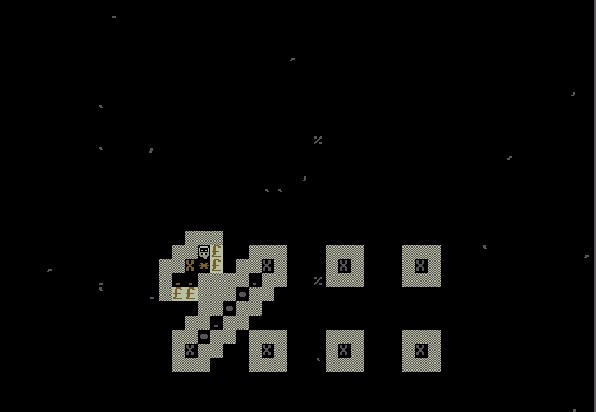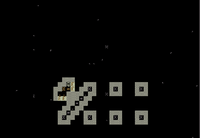- v50 information can now be added to pages in the main namespace. v0.47 information can still be found in the DF2014 namespace. See here for more details on the new versioning policy.
- Use this page to report any issues related to the migration.
Screenshot
These instructions explain how to create a screenshot to save or post on a wiki, forum, or elsewhere.
Capturing the image
- Note - for public pages, as stated by this wiki's rules, please use one of the two standard graphics displays (either the ASCII or the included tileset), and the standard colour scheme, not a custom graphics tileset or creative personal colour scheme that many players may not recognize. For User pages, bloodline games or other "personal" use, use what works for you, no problemo.
- Make the screen look how you want it - centered, open programs, etc. A screenshot will be wysiwyg, exactly what's shown on your monitor (unless you edit the image, which is not hard).
The next step depends on your operating system.
Windows
- Make sure your Dwarf Fortress window has the focus.
- Press Alt-Print Screen to capture the active window. The image will be placed in your operating system clipboard.
- If you want to capture the whole screen, press Print Screen instead.
- Open your image editor (usually MSPaint).
- Press Ctrl-v to paste the saved screenshot into paint.
- You now have a bitmap of the screenshot. You can edit this as with any bitmap in paint. (Handy for circling key areas, adding arrows, blacking out personal/private info, cropping, whatever.)
- Under <File>, select <Save As...>, and save your image as a PNG. (The wiki rules specify PNG rather than another format like JPEG.)
MacOS
- Press Command-Shift-4; the mouse cursor will turn into a crosshair.
- Press Space to turn the mouse cursor into a camera icon.
- Click on the window you want to capture.
- A new PNG file appears on your desktop, which you can rename and upload.
Adding an image to the wiki
Upload to a new File: page
First, your image needs to be uploaded to a simple wiki page that exists solely to contain your image.
- Give the file on your PC a unique and meaningful name (as per the rules). "7dwarves", "my fort" or "screenshot" probably aren't good choices!
- In the lower left sidebar of any wiki page, in the lower section marked "toolbox", click Upload file.
- On the file upload page, use the Choose file button to select your file.
- It is considerate to fill in the Summary field with either a short description or the same text you might include under the image in your article.
- Click the Upload file button. This creates a new page in the wiki containing your file, using your file name.
Add to an article
Once your image is uploaded to a File: page, you can edit other pages to add it to them.
- Copy the image's name, which is the page name minus the first word, "File:".
- If the image is on page File:Copper_strike.PNG, you want "Copper_strike.PNG".
- Go to the article where you want the image to appear and click edit.
- Add the name in double brackets, the same as creating any wiki active link, with the word "Image:", at the front of the image file name. Using just the file name gives the image as it was saved, so adding [[Image:Copper_strike.PNG]] to a wiki page gives this:
That is the actual file, actual size. - Click Show preview to make sure the layout is to your satisfaction.
- Click Save to commit your changes.
Advanced layout
You can modify the appearance of your image in the wiki by adding additional options after the file name, with pipes ( | ) between them. The most useful options are:
- Thumbnail
- "thumb" reduces the file size, making it fit in a wiki article better. Clicking the thumbnail image takes the reader to the actual file page with the full-size image.
- Size
- You can specify the size of the thumbnail by designating the maximum width in pixels, such as "150px" or "300px".
- Alignment
- "left" or "right" of text (default is centered above/below.)
- Caption
- adds comments below the image. All wiki editing tags can be used. No tag is needed, just a final pipe ( | ) and the text.
For example, if we type this:
[[Image:Copper_strike.PNG|thumb|right|200px|''(click to enlarge)''<br /> '''Copper Strike'''<br />This dwarf has struck copper.]]
We get an image that is (as shown to the right):
- Smaller (thumbnailed)
- Aligned right
- Sized to 200 pixels wide
- Labeled with text below it
Posting an image in a forum
To post an image in a forum on the web takes a little more work, but the steps are parallel to the above.
- Create the file as above.
- You have to host it somewhere. There are many good free web-hosts available; do a web search for "image hosting" and you'll find all you need (and will probably recognize a few). Follow the instructions to upload the image - should be generally similar to the Upload file steps for the wiki, above.
- (If you find an image on the web, it's possible to right-click and, in "properties", get the address there and use that as the hosted image. However, this is unreliable - if that image gets removed or that page changed, you can lose your link, and some sites prevent such linking. Uploading your own copy of an image to your own hosting site account is the only reliable method.)
- Note - Do not use this wiki to host images for linking on the forum or web - that is against the Terms of Use of most wikis, including this one.
- Once you have it hosted, copy the name - it will usually be something like
- http://i696.freeimagehostingsite.com/albums/blah/blah/blah/myimage.jpg
- Each forum or bulletin board uses slightly different code; the DF/Bay12 games forum uses:
- [img]http://i696.freeimagehostingsite.com/albums/blah/blah/blah/myimage.jpg[/img]
- (To see the code that a different forum uses, find a post with an image in it and click quote - you should be able to see the coding that precedes and follows the file name (the "http://...etc etc"). You can copy that, paste it into your post, and then replace that file name with your hosted image file name - done.)
- Use preview to make sure it looks right, and then post.
Edit the image
Use any image editor - MS Paint is common on Windows systems.
Open the image, edit as you prefer (adding text, circles, arrows, or cropping for size), and then save - maybe to a slightly different file name, so your original isn't corrupted - just in case.
Pro Tip: First, make a copy of the image and give that the new name - then open and edit that file. Then, when you hit Ctl + s out of habit, you'll be saving to that file name, not over the original.

